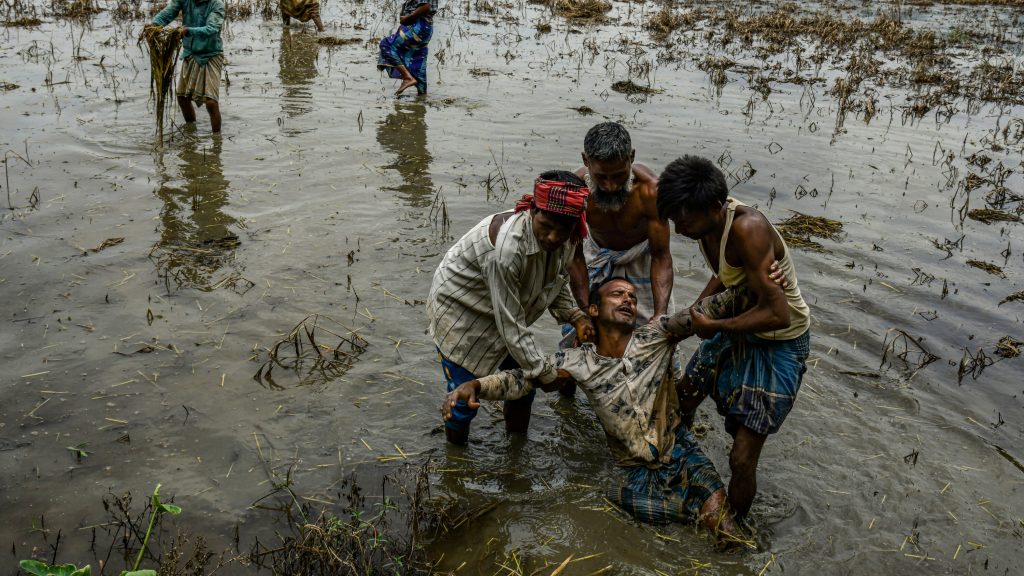By Dr. Gyan Pathak
Asia has a special stake in the Global Climate Crisis for its being the highly vulnerable region on the globe due to its geographical and socioeconomic circumstances, and India would be the worst sufferer under a high emission scenario that may cost the country 35 per cent of its GDP, much higher than 24 per cent (earlier estimate was 15 per cent) for Asia as a whole, 30 per cent in Southeast Asia, and 24 per cent in the rest of South Asia by 2100. China’s loss has been estimated at only 8 per cent.
An Asian Development Outlook Thematic Report titled “Asia in the Global Transition to Net Zero”, recently published by the Asian Development Bank, has said that the region faces increasing frequency and severity of storms, flooding, heat waves, and draughts under climate change. About 70 per cent of the global population susceptible to sea level rise is in Asia. Natural resource-based sectors, such as agriculture and fisheries, that are directly conditioned by climate, account for around third of total employment in the region. Beyond threatening the livelihoods of Asia’s poor, climate change may also put at risk regional and global food security. Climate change would also increase the spread of vector-borne and waterborne diseases, and deaths due to cardiovascular stress.
Rising temperatures, changing precipitation levels, droughts, heat stress, flooding, SLR (sea level rise), and salinity intrusion disrupt agriculture production through delays in crop harvesting, declining yields and product quality, and increasing incidence of pests and diseases. India emerges as the most vulnerable in the region with yields potentially reduced by 18% by 2070.Beyond threatening the livelihoods of Asia’s poor, climate change may also put at risk both regional and global food security, as the region accounted for 67% of global agricultural production.
Agriculture losses would be dominant in India and the rest of South Asia in near term. The dominant damage shares are also likely to disproportionately affect poor people, as they are more likely to live in areas at risk of flooding, depend on agriculture, and work in manual sectors affected by peak temperatures. As a majority of female employment in India and the rest of South Asia is in Agriculture, the large impacts on the sector in the sub regions may exacerbate gender inequality.
The top three emitters in developing Asia account for around one-third of 2019’s global GHG emissions. The top 10 emitters globally account for more than 60% of total GHG emissions, while the bottom 100 account for less than 3%. In developing Asia, the PRC, India, and Indonesia are the largest emitters, accounting for 23%, 6.8%,and 3.9% of global GHG emissions, respectively, in 2019.
Although historical emissions from developing Asia were low, they have been growing faster than the global average. The region’s share of global GHG emissions doubled from 22% in 1990 to 44% in 2019 and is expected to remain at this share until mid-century under current policies. At current levels of GHG emissions, the region would by itself exhaust the remaining global carbon budget consistent with limiting warming to 1.5 degrees Celsius (°C) by 2040.
Economic expansions are also likely to increase emissions. In 2021, the top 20 per cent households emitted seven times the emissions of the poor in India. As the poor households would grow up in the economic ladder, the pattern would also push emissions up increasing the challenge of achieving the net zero target.
Additionally, growth in the region has relied heavily on emission-intensive activities, with the emission intensity of GDP currently 41%higher than the rest of the world. A billion people in the region were still living on less than purchasing power parity of $3.20 a day in 2017 and 940 million lack reliable power supply, which depends largely on coal-based power plants. The region accounts for 94% of the global pipeline of coal-fired power plants under construction, planned or announced.
Coal is the largest source of energy emissions in developing Asia, accounting for about 70%, followed by oil (20%) and gas (10%)—a structure that has remained largely unchanged since the 1990s. Under the current policies scenario, the share of coal in primary energy will decline from about half to less than a quarter by 2050 and to 13% under more ambitious climate action.
All parties from developing Asia have submitted nationally determined contributions (NDCs) under the Paris Agreement, and19 economies, accounting for about 80% of the region’s 2019 emissions, have pledged to achieve net zero emissions. Ten economies, including the largest emitters, have submitted long term strategies. Yet, sector plans and policies often have yet to be aligned with climate pledges.
However, having studied five core scenarios of implementation, the report says that under current policies, mean global warming of 3.0°C is modelled by 2100. Implementing submitted NDCs reduces this to 2.4°C, which misses Paris Agreement goals due to insufficient collective ambition. National net zero pledges, if fully achieved, would take the world closer to Paris Agreement goals with 2.0°C of mean warming, but the costs are much higher than scenarios with more global coordination—and the costs fall disproportionately on lower-income countries. The largest emitter China’s emission would peak in 2025, while emissions from the second largest emitter India would continue to increase and account for more than a quarter of emissions from the region.
In 2021, $468 billion was invested in power supply in developing Asia, of which $397 billion was in renewable energy, electricity networks, and storage infrastructure. To achieve Paris Agreement goals, the modelling finds that average annual investments until 2050 would need to increase to $707 billion, corresponding to between 1.5%–2.7% of GDP for the economies and sub regions analyzed.
Asia stands to gain from ambitious climate action and Paris Agreement goals can be met with modest mitigation costs. If international coordination is enhanced it could substantially lower the cost of achieving the Paris agreement goals, the report says.
The report hopes that early action can minimize the long-term cost of mitigation, however it finds that NDCs are not ambitious enough, even in the short run. The overall cost of achieving net zero decarbonization can be reduced by 10%–20% if aggressive decarbonization starts immediately, rather than waiting until after the current NDC pledge period of 2030. (IPA Service)

 BSP Supremo Mayawati Playing Aggressive Minority Card In Up Civic Polls
BSP Supremo Mayawati Playing Aggressive Minority Card In Up Civic Polls 